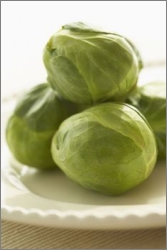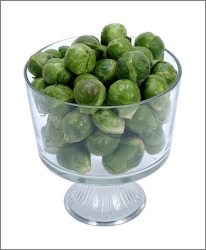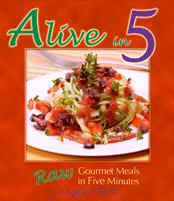Brussels Sprouts: Nutrition, Uses ...
and Some Interesting Insights
by www.SixWise.com
Brussels sprouts are, perhaps, the most loathed of all vegetables, ending up sneakily in countless children's napkins and eaten dutifully by many adults for no other reason than "they're good for me."
|
No one knows for sure where Brussels sprouts originally came from, but they were first mentioned around the late 16th century, and are thought to be native to Brussels, Belgium. |
But while some do detest their sulphery smell and sometimes bitter flavor, others are delighted by their tiny, cabbage-like appearance and tempted by their versatile nature. Brussels sprouts are actually considered delicious by many, and if you're inclined to disagree, maybe it's because you've never tasted them fresh from the garden, right after a frost, when they're incredibly sweet and irresistible (Brussels sprouts are one of the few veggies that actually taste better after the first frost of the season ... which puts them ready to harvest just in time for Thanksgiving for much of the United States).
If you're still not sure Brussels sprouts are deserving of words like "sweet" and "delicious," travel to Rogersville, New Brunswick in July or August. You'll get to experience their annual Festival des choux de Bruxelles (Brussels Sprouts Festival) and maybe will catch on to some of their excitement.
In the meantime, here are some more practical reasons to make Brussels sprouts one of your dietary mainstays.
Brussels Sprouts are Incredibly Healthy
Brussels sprouts are a member of the cruciferous family of vegetables (along with broccoli, kale, turnips, Bok choy, cauliflower and more), which are widely known for their potent cancer-fighting compounds, which help detoxify carcinogens in the body and may prevent healthy cells from morphing into cancerous ones.
|
According to Belgium folklore, if you eat Brussels sprouts at the beginning of your meal, you won't get drunk! |
There are at least a dozen compounds in Brussels sprouts and other cruciferous vegetables that have peaked scientists' interest, including sulforaphane, which triggers the liver to produce enzymes that detoxify cancer-causing chemicals, inhibits chemically-induced breast cancers in animal studies, and induces colon cancer cells to commit suicide, according to The World's Healthiest Foods.
Brussels sprouts specifically have been found to:
-
Decrease DNA damage, which may lower your risk of cancer
-
Reduce the development of pre-cancerous cells in the colon and liver
-
Help stop the proliferation of breast cancer cells, even in the later stages of growth
-
Lower your risk of bladder, lung and ovarian cancers
Brussels sprouts can even help to improve your skin (not to mention fight off infections), as they're rich in vitamin A and beta carotene. These tiny powerhouse also contain vitamin C, vitamin K, folate, manganese, fiber, potassium, vitamin B6 and thiamin (vitamin B1), iron, phosphorous, protein, magnesium, riboflavin (vitamin B2), vitamin E, copper and calcium.
| Looking for Quick, Unique and Delicious Recipes? Alive in 5: Raw Gourmet Meals in Five Minutes is packed with delicious (and fast!) raw food recipes that your whole family will crave! |
Simple Ways to Get the Most (Taste and Health Benefits) Out of Brussels Sprouts
Health wise organic Brussels sprouts are best as they have higher phytonutrient levels than conventionally grown varieties. It's also best to cook them only lightly (steaming works well for this), as this will help to retain the most phytonutrients and maximize their availability.
From a taste perspective, the way you prepare Brussels sprouts makes a big difference in their taste. Before cooking, always trim the base and cut an "x" in the bottom to allow it to cook evenly (you can also cut them in half). Steam them until they're tender, then season them with some butter, salt and pepper, or try them with olive oil, balsamic vinegar or even feta cheese. You can either leave them intact or cut off the base and separate the leaves (then toss them with seasonings and serve like a salad).
A favorite (and simple) holiday side dish, meanwhile, is roasted Brussels sprouts. Set the oven to around 400 degrees F, trim the Brussels sprouts then toss them with some olive oil and salt and pepper to taste. Roast them in the oven for about 40 minutes (or until the edges begin to brown slightly) and that's all there is to it.
Finally, do not overlook their deliciousness factor when eaten cold. You can toss cooked, cold Brussels sprouts with some olive oil, salt and lemon juice, or even a vinaigrette. If you want to be slightly more daring, but extremely cunning when it comes to your health, keep them on hand in the fridge to pop in your mouth as a quick salty snack. If cooked correctly and seasoned well, they can rival any potato chip or French fry when it comes to a salty craving.
Recommended Reading
The 11 Healthiest Autumn Fruits and Vegetables
Nine Foods that Help You De-Stress Quickly
Sources

















No comments:
Post a Comment